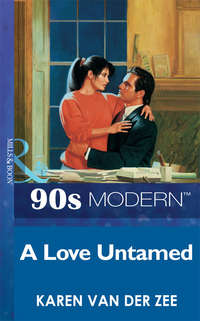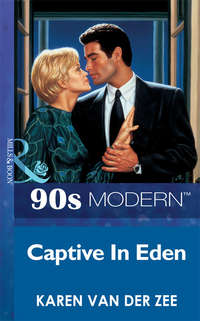
Полная версия
Rand's Redemption
What to wear? Shorts? Long slacks? A dress? She picked out a long slim cotton skirt and a white, sleeveless top that exposed nothing below her collar bones. Very demure, she thought and she looked at herself in the mirror and grinned. A little fresh makeup and she was ready.
Rand was already on the veranda when she arrived, one of the dogs asleep next to his chair. A man in shorts and work shoes sat across from him and was introduced to her as Patrick Collins, the ranch manager. He was about thirty, she guessed, with sandy hair and brown eyes in a tanned face. “Shanna Moore,” Rand introduced her. “She’s doing research for a university journal in the States.”
Patrick was interested and asked questions. “Come meet Rosemary,” he said, “she’ll help you find the right people to talk to.” Rosemary, he said, was his wife. They lived in a bungalow next to the ranch office just outside the workers’ village, which was four miles away. Rosemary knew everybody and would love to have her visit.
A teapot, cups and saucers, sugar and milk were set out on a low table. There was a plate of small sandwiches—cucumber and tomato. Very English. And peanut butter cookies, very American.
“These are good,” Shanna said, chewing the nutty cookies. “Taste like the ones my mother used to make. Fannie Farmer’s cookbook.”
Rand’s face tightened almost imperceptibly—she had not imagined it. She stared at him, wondering what it was she had said. He took a sandwich and ate it, not looking at her, and began a conversation with Patrick about the cattle dipping the next day and other ranch business matters. His left arm dangled over the armrest of his chair, his hand absently stroking the comatose dog by his side.
She couldn’t help looking at his hand, the gentle stroking of his strong fingers.
She listened to the men talk, drinking the strong tea and eating the sandwiches and cookies. It didn’t escape her that Rand did not take any of the cookies. Well, maybe he didn’t have a sweet tooth.
After the men left to take care of some more business, Shanna decided to get her notes for her article and work on the veranda for a while. Large open doors led into the sitting room and she looked around with fascination at the cheerfully decorated room—bright-colored paintings on the wall, Arab carpets on the polished floors. No ceiling, but the wooden beams and thatch of the conical roof were visible high overhead, the design a work of art in itself. A huge stone fireplace dominated one wall. The large cane rattan furniture with its thick cushions looked wonderfully comfortable, and a wall of shelves held books and African carvings. Blooming branches of pink and purple bougainvillea were arranged in a large glass jug which perched on a big round wooden coffee table.
This was not a house with cool elegance or showy opulence, but a living place with natural charm and a casual richness of comfort and color. She resisted the urge to linger and examine the artwork and books, feeling a bit indiscreet about it.
Having collected her work from her room, she returned to the veranda, finding Kamau, clearing away the tea things.
“The cookies were delicious,” she said in Swahili. “Did you make them?”
He nodded politely. “Yes, memsab. I always bake them for visitors.” He took the tray and left.
Shanna stared after him. Had there been a touch of sadness in his dark eyes, or had she just imagined it?
“I read that there’s a lot of wildlife on the ranch,” she said. “Doesn’t it interfere with the herds?” She’d seen the humpbacked Borana cattle this afternoon on her way to the house.
She and Rand were having dinner in the dining room and Shanna was trying to keep a conversation going, which was proving quite a challenge.
“Not generally, but sometimes.” On occasion a lion would become a problem, killing lambs or calves, and would have to be shot, he told her. He spoke in short, clipped sentences.
“What about poaching? We hear a lot about that these days.”
“Not on my ranch. We have a security system with guards who patrol the property boundaries. We haven’t had a problem for years.”
It was an awkward, stilted conversation. Not a real conversation at all. She was asking questions and he gave answers in an automatic fashion, as if they had rehearsed the lines from a script.
She looked down at her plate of beef in a wild mushroom wine sauce. “This is delicious. Did Kamau cook this?”
“Yes.”
“Who taught him how to cook?”
He drained the last of his wine. “My mother,” he said curtly. He reached for the wine bottle. “More wine?”
She nodded. “Please.”
Nick had told her that Rand had lost his mother when he was a boy. The cook must have started work in the ranch kitchen as a young man. Rand’s father had died five years ago, she knew.
From his responses, it was obvious that Rand had no desire to discuss anything remotely personal. She had, however, found out he had grown up an only child and had learned hunting and fishing from his father, had studied in both the U.K. and the States, and had returned to take over the running of the ranch.
“Was it lonely, growing up here?” she asked.
He raised his brows as if the question had never occurred to him. “No.”
“Where did you go to school as a child?”
“In Gilgil and Nakuru, boarding schools.”
He was not generous with information and seemed intent on keeping a careful distance, which did not make for a relaxing atmosphere. Standoffish, Lynn had called him. Well, he was. She found his reserve unnerving and it took an effort to be her cheerful, friendly self. He was excruciatingly polite and it was obvious that she was far from a treasured guest. She was relieved when the meal was over. Rand pushed his chair back and came to his feet.
“Now, if you’ll excuse me, I have some work to do in my study.”
“Of course.” She stood up as well and he held open the door for her.
“Wait,” he said as she moved past him. She stopped, surprised, saw him looking at her left shoulder.
“Your…earring…” he said, and she automatically felt her left ear and found the ring gone. Somehow it must have worked itself loose.
“It’s caught in your hair,” he said, reaching for it, as she reached for it.
They both froze, their hands gripped together in her hair. Their eyes met and all she could feel was his big hand, his fingers tangled with hers, the warmth of them. The sudden crazy pounding of her heart.
For a moment that seemed like an eternity they simply stood there looking at each other, not breathing. Then they both let go at the same time and the earring slipped lose from her hair and fell to the wooden floor where it bounced harmlessly under a chair. He rescued it from its hiding place and handed it to her, dropping it into her palm without touching her.
“Thank you,” she said.
“Don’t mention it.”
And then she moved past him into the hall and went into her bedroom while he continued to his study.
She sat down on the side of the bed and let out her breath slowly, realizing her body was all tensed up. She unclenched her hands, rubbed her forehead.
This was too nerve-racking for words. Maybe it had been a mistake to come here. Maybe she should have stayed in the hotel in Nyahururu.
No, said a little voice, you were curious about Rand Caldwell.
Impatient with her own thoughts, she came to her feet and picked up the big, padded envelope she’d put on the desk when she’d unpacked her luggage. She opened it and slid out several notebooks and a sheaf of manuscript papers.
Her father’s personal journals. Four years of observations, thoughts, notes, and anecdotes, written while living in Kanguli. Like the man he had been, his handwriting was simple and clear and easy to read.
Using the journals, her father had started writing a book for publication. It had only been half-finished when he and her mother had died tragically when a drunken driver had careened into their car at high speed.
It had taken her a long time to gather the courage to read the journals, and once she had, a floodgate of emotion had been opened inside her. He had written about people and animals, about loving and living African-style. The stories were touching or humorous. She had wept and laughed. She had known then, that the book could not go unfinished. Other people would be entertained and inspired by her father’s work. It deserved to be shared.
Like the scientist he was, her father had made a detailed outline and plan for the book. She had studied the finished section, discovering that the material was in essence taken straight from the journals, organized and rearranged in a new format.
She had sat at her desk, her hands trembling, her heart pounding. I can do it, she’d thought, and the words had echoed in her head for days like a secret mantra. I can do it. I can do it. I can do it.
Her love of writing, of expressing her thoughts and feelings on paper, she had inherited from him. She was her father’s daughter and she’d felt the swelling of joy and pride inside her.
I can do it.
She could do it. She was, in fact, uniquely qualified to do it.
And so the planning had begun. She had found a publisher who was interested in the project—in actual fact, she’d found two. She’d made a choice, signed a contract and received an advance large enough to make her stay here possible, backed up with the money from her parents’ life insurance policy.
Shanna looked down on the papers and smiled. And here she was, back in Kenya, where her father had begun the journals, and where she would finish the book. In the next few days she’d have to tell Nick that she had decided to stay and was not flying back with him to the States at the end of next week.
She did not want to go back to her apartment where so much reminded her of Sammy. It would be easier to deal with her feelings here, in another environment, doing something interesting. And certainly finishing the book here would be so much easier.
She settled at the desk and switched on her laptop computer. She studied the outline for chapter eight and found the journal entries assigned to it, absorbing the sounds coming from the bush outside through the open window.
Three hours later she came to her feet, stiff and tired, but feeling a great sense of accomplishment. Too keyed up to go to sleep, she quietly slipped out of her room, along the passage to the veranda.
The air was cool and the only light anywhere came from the stars and a half moon. The world was dark and full of sounds—mysterious, frightening. Below in the gorge animals were sleeping, or hunting. It was wild, secret and dangerous out there and she shivered a little.
From the house behind her came footsteps and Rand appeared next to her with a drink in his hand. Her heart made an awkward little leap as she looked at him in the pale moonlight and a thought floated through her mind. Rand was like the gorge below—wild and secret.
And dangerous.
She could sense it, yet not understand it. If he were a threat to her, then why?
It wasn’t physical, she knew that. It was a more subtle danger, more insidious, more devastating. He could hurt her.
She shivered again. What made her think like this?
“You’re up late,” he said evenly.
“I was working. Now I’m too excited to sleep.”
“Excited? Why?”
“I still can’t believe I’m really back here after all these years. In a way I was afraid.”
“Afraid of what?”
“To spoil my memories. I was afraid I would be disappointed.”
“And you’re not.”
“No, oh, no! Not in the least.”
A coughing sound came from somewhere in the darkness.
“Leopard,” said Rand, “down in the gorge.”
Leopard.
She hugged herself.
“Cold?” he inquired politely.
She shook her head. “No, just…I don’t know. Overwhelmed, I think. At home I’d hear cats meow or dogs bark. Now, here I am, listening to a leopard.”
They were silent for a while, standing there together listening to the mysterious darkness.
She glanced at his shadowed face. “Did you ever think of settling in the States or England when you were there?” she asked.
“No,” he said shortly. “This is my home. I can’t imagine living anywhere else.”
She could well understand it. The place had a hypnotic atmosphere, a magnetic pull. “I imagine it’s too romantic a view, but it seems a wonderful kind of life here.”
He gave a short laugh that held no humor. “Romantic indeed. And naive. Not many people can take this kind of wonderful life for very long.” His voice held a note of disdain. “Most people need the excitement and stimulation of cities and people around them,” he said flatly. “You live in Boston, you must know.”
“Yes, but city life can get very stressful. I like to get away. I often do. I enjoy being with people, but I also like to be by myself.”
“Where do you go to be by yourself?”
“The beach, the woods, the park. I like to walk. It gives me a chance to hear myself think. I rather like my own company at times.”
There was a silence.
She glanced over at him. “Does that sound conceited? That’s not how I mean it.”
He raised his brows fractionally. “How do you mean it then?”
She frowned. “I think…” What she wanted to say was that she was comfortable with herself, with the person she was. She was not afraid of her own feelings or her own thoughts. She had no idea how she was going to say that without sounding over the top.
“You think what?” he urged.
She took a deep breath. Well, she had to finish what she had started. “I’m comfortable with myself,” she said. “I’m not afraid of my own thoughts and feelings.” She didn’t care what he thought.
“And what does that mean?”
She searched for words. It was a strange conversation to be having with him. “I’m quite aware I’m a flawed human being, but I try to live…honestly, to be aware of other people’s feelings and needs, and not to be too judgmental.” That sounded pretty good, but she had to admit that not being judgmental wasn’t easy where it concerned Mr. Caldwell.
“Judgmental?”
“It’s easy to criticize other people, but you can’t tell what’s in someone’s heart, and you don’t always know the reality of someone else’s life.”
“How very noble,” he said, and his voice was coldly mocking. “Is this little speech for my benefit? A less-than-subtle hint perchance?”
His voice chilled her to the bone. “What is that supposed to mean?”
“Don’t play the innocent, will you?” He turned and strode back into the house.
Her astonishment overwhelmed even her anger. She had no idea what he had been hinting at. She stood motionless at the veranda railing, staring out into the darkness. Then anger took the upper hand. This was outrageous! This was going too far!
She stormed in after him. “Rand!” she called, and he stopped and turned, hands on his hips. Brows arched sardonically.
“Yes?”
She moved in front of him, heart racing, legs trembling. “I’d like to know what’s going on here!” She crossed her arms in front of her chest. “You don’t like me. First I assumed it was something general—your not liking women, or just simply having a rotten disposition, but now I know it’s more than that. I’m not given to paranoia, but I’m beginning to think that this is a rather personal thing and I’d like to know what you’ve got against me. You don’t even know me!”
“Oh, I know you,” he said frigidly. “I know your type.”
“My type?” It was getting more preposterous by the minute.
“Beautiful, selfish, and deceitful.”
She felt her mouth begin to drop open and she clamped her jaws shut just in time. The man was a lunatic! She took a steadying breath.
“If you feel this way, why in the world did you invite me to stay at your house?”
His mouth curved with faint contempt. “To keep you from going back to Nairobi. Nick told me that Melanie arrived unexpectedly, to surprise him.”
Melanie was in Nairobi? How was that possible? Nick had tried to persuade her to come along for a while, a week, even just a few days, but she’d not wanted to be away from the kids, not so far. And now she was here anyway? It had to be a mistake.
“Melanie?” she asked, incredulous.
“Yes, Melanie,” he bit out. “Nick’s wife. You do know he’s married?”
“Of course I know he’s married! What—”
“Well then, perhaps you’ll agree it would be more discreet to stay out of their way?” His icy gaze bored into hers. “Surely you’re not totally without scruples?”
CHAPTER THREE
RAND opened the door and marched out as if he could not tolerate being in her presence a moment longer.
Stunned, Shanna sagged into a chair and stared at the door. Suddenly it was all very clear—all the pieces fit. Rand thought she was having an affair with Nick. She was the woman Nick was fooling around with on the side and this trip to Kenya was a perfect opportunity to be together. His own wife was too busy with the children, wasn’t she? Shanna could hear Rand’s thoughts as if he were talking out loud.
It was so absurd that when the initial shock wore off, she could only laugh. It was too crazy for words.
He was seeing her as a femme fatale who’d trapped his poor friend in a web of sin. He did not approve of such immoral behavior. He had standards.
Well, having standards was good. She liked men who had standards. However, judging and condemning others was not such a good idea always. And certainly not when you weren’t in possession of all the facts.
For a while she sat in the chair without moving, going over it all again, and the humor faded. No one had ever thought so badly of her, not to her knowledge, and it wasn’t a good feeling. What had she done to make him judge her this way?
And then another thought occurred to her.
Why did Rand care? What was it to him who she was? He and Nick hadn’t seen each other in years. It was none of his business what Nick did with his private life.
She sighed wearily, feeling suddenly exhausted. Well, there had been enough upheavals for one day. Perhaps this mystery would be solved later. In the meantime, she was tired and she wanted to go to bed. Tomorrow she’d set the high-and-mighty Mr. Rand Caldwell straight, explain to him that he was quite mistaken in his diagnosis of the situation and that perhaps he should not jump to conclusions quite so quickly in the future.
She awoke to a glorious morning. The open window revealed a square of vivid blue sky decorated with a blooming branch of amethyst bougainvillea which swayed gently in the breeze—like a living painting. She lay still, absorbing the sounds coming from outside—chickens clucking, birds twittering in the bushes. What joy to wake up to such serenity every morning. She let out a languorous sigh.
A soft, tentative knock came on the door. Whoever it was, it wasn’t Rand. Tentative was not one of his behavioral characteristics.
“Come in,” she invited.
A young girl in a pink cotton dress came in with a tea tray. She smiled, her big eyes looking at Shanna with curiosity.
“Good morning, memsab,” she said in Swahili. “I have brought you your chai.” She placed the tray on the bedside table, picked up the small pot and poured the tea in the low, wide cup.
“Asante sana.” Shanna smiled back at the girl. She was sixteen or so, and very pretty. “What is your name?”
“Catherine. Please let me know if you need anything.”
“Thank you, I will.”
The girl withdrew and closed the door behind her.
Shanna looked at the tea. It was very dark. She was used to drinking coffee in the morning, but this seemed to add a touch of authenticity. Tea for breakfast. Very English. She added milk and sugar and contentedly sipped the strong, sweet brew.
After she’d dressed, she found Rand in the kitchen talking to Kamau. Bush hat on his head, keys dangling from his hand, he was ready to leave. For some perverse reason she felt a twinge of disappointment.
Disappointment? What was wrong with her? Did she want to sit across from him while she ate her breakfast?
“Good morning,” she said, trying to sound light.
His cool gaze barely met hers. “Good morning,” he returned in a businesslike tone—a tone so impersonal it set her teeth on edge.
“We have to talk,” she said, bracing herself. Might as well get it out of the way.
“It will have to wait,” he said and strode out the door without giving her another look. A moment later she heard the car engine start and Mr. Rand Caldwell had departed for the day, she assumed. Well, good riddance.
She ate a solitary breakfast, prepared by the dignified Kamau, sitting on the dining room terrace. The air was crisp and effervescent like champagne. Feeling restless, she decided to go for a walk before settling down to work. Strolling through the garden, she reveled in the joyous color and fragrance of the flowers, the many blooming bushes and trees—frangipani, jasmine, bougainvillea. Who had designed and planned this gorgeous place?
She left the fenced-in garden, but stayed reasonably close to the house, not leaving the established paths, trying to get closer to the gorge. Below pools of water shimmered in the sunlight. Birdsong filled the air, and butterflies fluttered around the blooms. She sat down on a large bolder and surveyed her surroundings with her binoculars.
Конец ознакомительного фрагмента.
Текст предоставлен ООО «ЛитРес».
Прочитайте эту книгу целиком, купив полную легальную версию на ЛитРес.
Безопасно оплатить книгу можно банковской картой Visa, MasterCard, Maestro, со счета мобильного телефона, с платежного терминала, в салоне МТС или Связной, через PayPal, WebMoney, Яндекс.Деньги, QIWI Кошелек, бонусными картами или другим удобным Вам способом.







